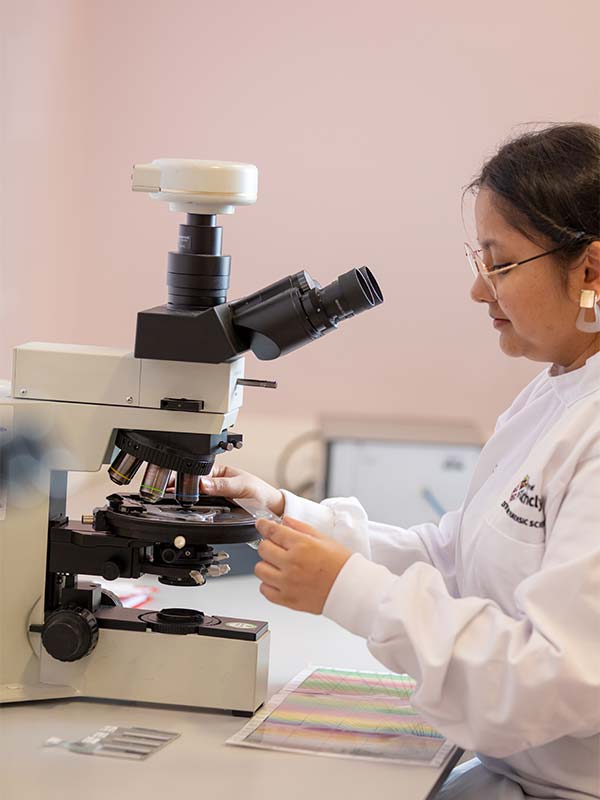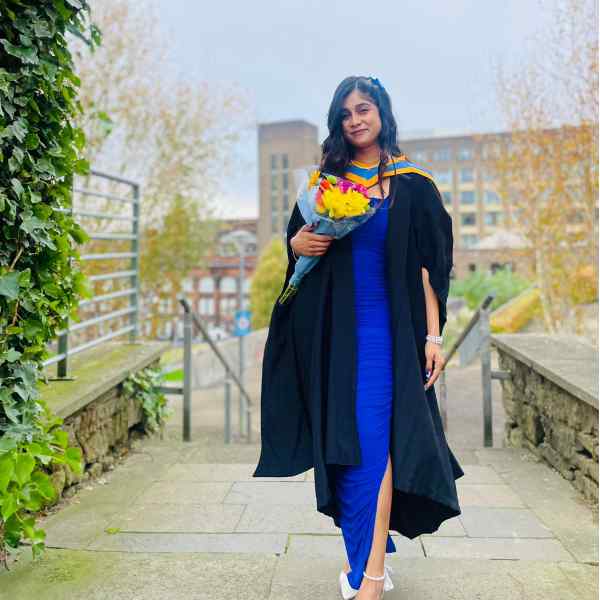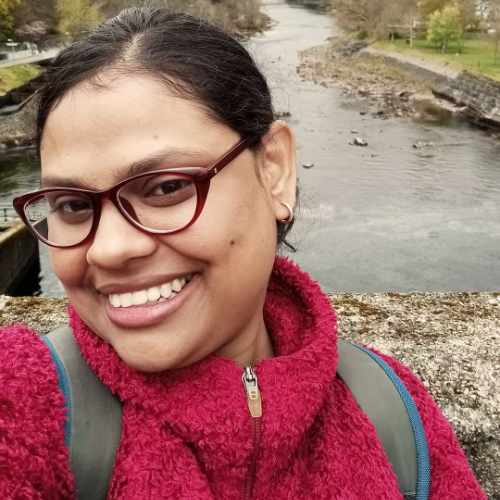MSc Biomedical Sciences
ApplyKey facts
- Start date: September
- Study mode and duration: 12 months full-time
Study with us
- opportunity to select a clinically-orientated or basic life science research pathway
- develop skills in statistics, communication, ethics, science writing and experimental data analysis
- gain experience in the research funding process
- a comprehensive three-part postgraduate life sciences training
The Place of Useful Learning
UK University of the Year
Daily Mail University of the Year Awards 2026
Scottish University of the Year
The Sunday Times' Good University Guide 2026
Why this course?
Firstly, unlike many Biomedical Sciences Masters courses, we offer you dedicated training in a broad suite of bioinformatics and practical laboratory skills. These will not only be great preparation for future research careers, but also a way to make the most of your summer research project.
Secondly, our taught classes capture the excitement of cutting-edge research fields.
The substantial choice of classes means that you'll get to select a clinical-oriented or basic life science research pathway to suit your future aspirations.
The course provides the perfect springboard to future training at PhD level, or gives you a range of experience that will prove attractive to employers from industry or the health-care provision sector.
What you’ll study
This course will provide training on fundamental techniques for the four disciplines:
- biochemistry
- immunology
- microbiology
- pharmacology
Aligned with the taught component of this course, these disciplines will form the grounding for your summer project.
You'll also learn vital transferable skills in statistics, communication, ethics, science writing and critical analysis of data – the perfect way to prepare for any future career.


Chat to a student ambassador
Want to know more about what it’s like to be a Science student at the University of Strathclyde? A selection of our current students are here to help!
Our Unibuddy ambassadors can answer all your questions about courses and studying at Strathclyde and offer insight into their experiences of life in Glasgow and Scotland.
Learning & teaching
The course is delivered through lectures, tutorials and hands-on practical sessions.
If you successfully complete the required taught classes, you'll undertake a research project for the MSc.
Assessment
Assessment of taught classes is through multiple choice tests, computer quizzes, problem-solving scenarios, poster and oral presentations, essays, and formal written exams. The laboratory project is assessed through a written thesis.
Teaching staff
The following staff are all involved in the teaching and research project supervision on the MSc Biomedical Sciences (project availability may vary year-to-year).
|
Staff member |
Research expertise |
|---|---|
|
Dr Wilson’s research interest is on endothelial calcium signalling, which plays an important role in monitoring impaired hypertension and other cardiovascular diseases. |
|
|
Dr Tian’s research interest is cardiovascular physiology, biomechanics and biology, particularly in pulmonary hypertension. His group has recently focused on right ventricular fibrosis and function in pulmonary hypertension. |
|
|
Studies in Prof Gould’s group seek to understand the cellular and molecular mechanisms which regulate glucose transport in adipocytes, cardiomyocytes and skeletal muscle. Studies focus upon identifying the molecular machinery that control GLUT4 function, defining how this machinery interacts with the insulin signalling system, and defining how these processes are impaired in disease. |
|
|
Dr Drummond’s current focus is on understanding the mechanisms whereby pulmonary vein cardiomyocytes generate spontaneous electrical activity, and in particular the role that intracellular Ca²+ plays in this process. He is also interested in determining how electrical activity is propagated along the pulmonary vein to the atria, where it can then trigger atrial fibrillation. Since current drug treatments for atrial fibrillation are of limited efficacy, identification of potential novel therapeutic targets for future drug development is extremely important. |
|
|
Dr Rotondo’s research interests have centred on the pivotal role that monocytes play in coordinating immune responses by releasing cytokines, prostaglandins and fatty acids. |
Meet our MSc Biomedical Sciences students

Aditi Tambe
Strathclyde isn’t just a place to study; it’s a place where you’ll grow, make lifelong connections, and feel part of a community. If you’re looking for a university that challenges you academically while supporting you personally, Strathclyde is the perfect choice.

Pousali Chatterjee
The University of Strathclyde is a great place for learning! One of my favourite aspects of this course experience and this university is how committed the faculty members are to my academic accomplishments. The MSc Biomedical Science programme is a highly engaging, well-taught, diverse course that prepares students for a wide range of professional options in the field of health sciences.

Natasha Kok Wan Theng
The lecturers also take into consideration the many students coming from diverse backgrounds, as they are very patient and eager to explain things as best as they can, while also prompting us to think more proactively.
Course content
Choose one 10-credit and two 20-credit elective modules across semesters one and two.
Compulsory modules
Essential Skills and Employability for Masters Students (20 credits)
Refine your core skills in statistics, data presentation and career development while also learning about the ethical choices and dilemmas that you might face in your scientific careers.
Entrepreneurship (10 credits)
Learn from experts from the Hunter Centre for Entrepreneurship, what it takes to translate bright ideas in biomedical sciences into patents, business plans and spin-out companies.
Advanced Techniques in Biomedical Research 1 (10 credits)
This is a two-semester compulsory laboratory module. Both modules will help develop your skills in data analysis and report writing. This will help pave the way for a smooth transition into your summer research project, Advanced Topics in Biomedical Research.
This first module, which is delivered in the first semester will provide you training in key research skills in a range of standard techniques to be applied to specific problems in molecular biology research.
Elective modules
In Vivo Biology (10 credits)
Gain real practical experience in the safe and ethical application of in vivo research by being trained to Home Office Personal License standard. Discover how in vivo biology has driven the development and testing of new drugs and medical techniques that save and improve human lives.
Postgraduate Studies in Pathology (20 credits)
In this elective module you'll examine progress in cytogenetics, molecular diagnostics, and histopathology in the diagnosis, aetiology and treatment of human disorders. Learning will be achieved through lectures, tutorials and workshops – many of which will be given by external experts from the National Health Service (NHS).
Compulsory modules
Advanced Techniques in Biomedical Research 2 (10 credits)
This is the second part of the two-semester compulsory laboratory module. This module will expose you to various assay procedures used widely in biochemistry, pharmacology, microbiology and immunology fields through hands-on laboratory exercises and further develop your analytical skills through workshops.
Advanced Topics in Biomedical Research (20 credits)
A unique and innovative module designed with three outcomes in mind:
- become an expert in the field that you'll study for your summer research project & learn how to write a review paper that aims to be publication quality
- learn how a scientific research career really works from the experts & then write the outline of a hypothetical research grant application
- enhance your teamwork on a virtual project to develop a hypothetical drug from high-content screen, through in vivo testing in models, to transcriptomics & human clinical trials & pharmacogenomics. You'll not only learn how to manage a project’s timelines & targets, but also enter the world of big data manipulation and analysis
Elective modules
Drug Discovery (10 credits)
The aim of this module is to introduce you to practical skills required to set up robust drug discovery assays in both academic and industrial settings. The pathway from pathology or biological pathway to small molecule drug candidate is explored in this unique module. Become familiar with the modern laboratory assays and screening approaches used by Big Pharma to develop their blockbuster drugs.
Postgraduate Studies in Haematology (10 credits)
In this elective module you'll explore the science and regulation of blood and blood products within the National Health Service. Study material includes immunodiagnostics, immunohaematology and transfusions, and immunopharmacology. Learning will be achieved through lectures, tutorials and workshops – many of which are delivered by expert clinicians from the National Health Service.
Postgraduate Studies in Clinical Biochemistry (20 credits)
In this module you'll explore the range of diseases and disorders afflicting human body systems – and discover how they are diagnosed by clinical biochemists working within the National Health Service.
From the liver to the heart and kidney – by way of cancer, pregnancy and poisons – this wide-ranging class delivers a fantastic clinical overview of human illness.
Learning will be achieved through lectures, tutorials and workshops – many of which are delivered by expert clinical biochemists from the National Health Service (NHS).
Postgraduate Studies in Clinical Immunology (20 credits)
The aims of this module are:
- to give you an understanding of the immune responses associated with Immune responses associated with transplantation
- to give you an understanding of the immune responses associated with cancer
- to give you an understanding of the immune responses associated with autoimmunity
- to give you an understanding of the immune responses associated with immune responses associated with allergy
- to give you an understanding of the immune responses associated with immunodeficiency
Postgraduate Studies in Applied Microbiology (20 credits)
This module explores modern industrial biotechnology (IB), enabling you to understand microbial process development and how molecular biology is revolutionising the IB sector. You'll address the key concepts of bioreactor and process design including the importance of downstream processing and process monitoring.
This module also introduces the importance of systems and synthetic biology in advanced IB, and the roles of microorganisms in wastewater treatment, bioremediation and biofouling.
60 credits
Choose from a selection of research project topics on clinical-oriented or basic life-science research pathways, to suit your future aspirations. Aligned with the taught component of this course, these disciplines could include that of biochemistry, immunology, microbiology, and pharmacology, which will form the foundation for your summer project. You can choose from four type of projects:
Laboratory-based experimental projects
These aim to develop a range of skills required for performing experimental research in a laboratory and generating novel data. The type of skills acquired are project-specific. These projects are appropriate if you're interested in a career in experimental laboratory research in industry or academia, e.g. PhD/research assistant/biology-based industrial company, where lab skills are of importance.
Critical analysis
These aim to develop a range of skills required for carrying out analysis of data reported in scientific literature. Skills include finding appropriate peer-reviewed studies, critically analysing the methods used and the data presented and coming to a clear conclusion whether the data support or refute a hypothesis. These projects develop skills in reading technical literature, formulating hypotheses, synthesising and critically appraising information and developing new ideas.
Data analysis
These aim to develop a range of skills required for carrying out analysis of scientific data. This could be data previously generated in the supervisor’s laboratory or data collected from previously published literature. They may involve generating and using spreadsheets and specialist data analytical packages. These projects develop skills in working with data, using statistical analyses, creating models, critically appraising information and developing new ideas.
Data-mining
These aim to develop a range of skills required for carrying out analysis of scientific data present in databases, e.g. genomic sequences. They may involve using spreadsheets and specialist data analytical packages. These projects develop skills in working with databases, data, using statistical analyses, creating models, critically appraising information and developing new ideas.
Entry requirements
| Academic requirements | Minimum second-class (2:2) Honours degree or overseas equivalent in a biological or chemical discipline. |
|---|---|
| English language requirements | You must have an English language minimum score of IELTS 6.0 (with no component below 5.5). We offer comprehensive English language courses for students whose IELTS scores are below 6.0. Please see ELTD for full details. As a university, we now accept many more English language tests in addition to IELTS for overseas applicants, for example, TOEFL and PTE Cambridge. View the full list of accepted English language tests here. |
Pre-Masters preparation course
The Pre-Masters Programme is a preparation course held at the University of Strathclyde International Study Centre, for international students (non-UK/Ireland) who do not meet the academic entry requirements for a Masters degree at University of Strathclyde.
Upon successful completion, you'll be able to progress to this degree course at the University of Strathclyde.
Fees & funding
All fees quoted are for full-time courses and per academic year unless stated otherwise.
Fees may be subject to updates to maintain accuracy. Tuition fees will be notified in your offer letter.
All fees are in £ sterling, unless otherwise stated, and may be subject to revision.
Annual revision of fees
Students on programmes of study of more than one year (or studying standalone modules) should be aware that the majority of fees will increase annually.
The University will take a range of factors into account, including, but not limited to, UK inflation, changes in delivery costs and changes in Scottish and/or UK Government funding. Changes in fees will be published on the University website in October each year for the following year of study and any annual increase will be capped at a maximum of 10% per year. This cap will apply to fees from 2026/27 onwards, which will not increase by more than 10% from the previous year for continuing students.
| Scotland | £12,550 |
|---|---|
| England, Wales & Northern Ireland | £12,550 |
| Republic of Ireland |
If you are an Irish citizen and have been ordinary resident in the Republic of Ireland for the three years prior to the relevant date, and will be coming to Scotland for Educational purposes only, you will meet the criteria of England, Wales & Northern Ireland fee status. For more information and advice on tuition fee status, you can visit the UKCISA - International student advice and guidance - Scotland: fee status webpage. Find out more about the University of Strathclyde's fee assessments process. |
| International | £32,900 |
| Available scholarships | Take a look at our scholarships search for funding opportunities. |
| Additional costs | Course materials You will have to pay extra for your lab coat and safety goggles. All recommended textbooks are available in the library (and some freely available as online resources). However you may wish to purchase your own copies. Other costs There are returnable deposits for entry keycards and lockers (depending on your project location within Strathclyde Institute of Pharmacy & Biomedical Sciences). International students If you are an international student, you may have associated visa and immigration costs. Please see student visa guidance for more information. |
Please note: the fees shown are annual and may be subject to an increase each year. Find out more about fees.
How can I fund my course?
Scottish postgraduate students
Scottish postgraduate students may be able to apply for support from the Student Awards Agency Scotland (SAAS). The support is in the form of a tuition fee loan and for eligible students, a living cost loan. Find out more about the support and how to apply.
Don’t forget to check our scholarship search for more help with fees and funding.
Students coming from England
Students ordinarily resident in England may be to apply for postgraduate support from Student Finance England. The support is a loan of up to £10,280 which can be used for both tuition fees and living costs. Find out more about the support and how to apply.
Don’t forget to check our scholarship search for more help with fees and funding.
Students coming from Wales
Students ordinarily resident in Wales may be to apply for postgraduate support from Student Finance Wales. The support is a loan of up to £10,280 which can be used for both tuition fees and living costs. Find out more about the support and how to apply.
Don’t forget to check our scholarship search for more help with fees and funding.
Students coming from Northern Ireland
Postgraduate students who are ordinarily resident in Northern Ireland may be able to apply for support from Student Finance Northern Ireland. The support is a tuition fee loan of up to £5,500. Find out more about the support and how to apply.
Don’t forget to check our scholarship search for more help with fees and funding.
International students
We've a large range of scholarships available to help you fund your studies. Check our scholarship search for more help with fees and funding.
International students
We've a thriving international community with students coming here to study from over 140 countries across the world. Find out all you need to know about studying in Glasgow at Strathclyde and hear from students about their experiences.

Careers
We work closely with the University's Careers Service. They offer advice and guidance on career planning and looking for and applying for jobs. In addition they administer and publicise graduate and work experience opportunities.
Our graduates
Biomedical scientists work in healthcare to diagnose disease and evaluate the effectiveness of treatment through the analysis of fluids and tissue samples from patients.
They work at the heart of modern medicine, with 70% of diagnoses based on the pathology results provided by laboratory services.
After graduating you should be ideally qualified for positions in biomedical and pharmaceutical industries as well as hospitals and universities.
You may wish to continue studies for an MPhil or PhD.
This course provides the background training for a career in:
- clinical biochemistry
- laboratory technical support
- medical/pharmaceutical/life science sales
- academia – following a further PhD route
Apply
There is currently no deadline for submitting applications. However, we encourage you to apply early as we consider applications on a first come, first served basis, and may introduce an application deadline due to high demand.
Start date: Sep 2026
Biomedical Sciences
Contact us
Glasgow is Scotland's biggest & most cosmopolitan city
Our campus is based right in the very heart of Glasgow. We're in the city centre, next to the Merchant City, both of which are great locations for sightseeing, shopping and socialising alongside your studies.
Have you considered?
We've a range of postgraduate taught and Masters courses similar to this one which may also be of interest.

